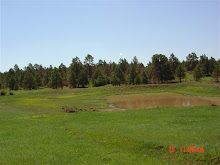Normally I try not to post the same things as Drilling Santa Fe because I figure a lot of people read both and it's nice to get a variety of news. Today's news from the New Mexico Independent is too bad not to post though. The impacts of this decision could have far reaching consequences that go way beyond Helena Chemical and Arturo Uribe. Obviously, since the company was investigated and fined for violations, Mr. Uribe was not making up stories.
For some general information about SLAPP (Strategic lawsuit against public participation), click here.
Uribe ordered to pay $75k in punitive damages
By Laura Paskus 4/9/10 12:25 PM
Wednesday night, a jury found a southern New Mexico activist guilty of defamation and harassment against a chemical company.
Now, Arturo Uribe, a 40-year old social worker, owes the Tennessee-based Helena Chemical Company $2 in damages and $75,000 in punitive damages.
“The most important thing is we wanted the lies to stop—the amount of money was not something that was important to Helena—and we wanted to set the record straight in a forum where proof and evidence matter,” Robert Soza, Jr., Helena’s attorney told The Independent. “Though, I think that the money does send a message to Mr. Uribe and others who think that defamation is way of getting their point across: It’s not going to be permissible. It’s unlawful.”
In December 2008, Helena Chemical Company sued Uribe in New Mexico’s Third Judicial District Court in Las Cruces, saying he had repeatedly defamed Helena in public statements. According to the company, Uribe had harassed employees at the Mesquite branch and defamed the company via six individual slides within various presentations at community meetings, and when he told a television reporter: “We’re gonna allow companies and industry to contaminate us and knowingly do it and do nothing about it? I’m insulted; I’m hurt more than anything.”
The lawsuit was filed to silence an outspoken activist, Uribe’s attorney says
Two months prior to Helena’s suit against him, Uribe and 22 community members had filed a lawsuit in state court alleging that the chemical company’s emissions were sickening local children. Health problems include chronic respiratory infections, asthma, severe chronic bronchitis and nosebleeds.
According to Uribe’s attorney, Linda Thomas, Helena’s suit against Uribe was filed to silence the activist. Uribe had repeatedly reported information to the New Mexico Environment Department. In turn, she said, the department had investigated the facility, found violations and levied fines against Helena. “To us, this was a clear, malicious abuse of process,” she said. “They had filed the suit to shut him up.”
Thomas also said she was worried about how the jury’s decision will affect people living in Mesquite: “They’re not going to go back to their community and feel safe—they’re going to feel like they can’t speak out because they’re worried they’re going to be sued.” The case will also have nationwide implications, for activists on both sides of the political spectrum: “This decision is going to have a chilling effect on everyone in the country, on anyone who might want to stand up against polluters in their community, or meet with other community members to talk about concerns.”
Company had been hit with a $233,777 fine for not complying with air quality regulations
Just south of Las Cruces, the town of Mesquite doesn’t merit much notice—even from those who might meander toward El Paso along back roads rather than zipping down Interstate-10. Tallied during the 2000 Census, the population was almost 95 percent Hispanic or Latino—and until 2004, the chemical company had escaped attention from the state’s agency in charge of environmental safety.
That is, until residents such as Uribe—along with state Rep. Joseph Cervantes, D-Las Cruces, Sen. Cynthia Nava, D-Las Cruces, and Doña Ana County commissioner Oscar Butler—complained to the New Mexico Environment Department about Helena’s impacts on the community.
In early 2004, NMED first inspected Helena’s facility, where chemical fertilizers are received in bulk, then mixed and sold to local farmers. Later that same year, the state issued a Notice of Violation against Helena—for operating its plant without an air quality permit.
Under state law, the company had to install wells that monitor chemicals in the groundwater, submit what is called an “abatement plan”—a plan to investigate and contain groundwater pollution—and comply with investigations into air and occupational health and safety issues.
The state also hit Helena with a $233,777 civil penalty for not complying with New Mexico’s air quality laws and regulations. At that time, in June 2005, the department issued a press release quoting deputy secretary Derrith Watchman-Moore saying, “Since our first inspection a year and a half ago, we have consistently and patiently made every attempt to work with them and get them into compliance. Our patience is now at an end. This order is a clear message to Helena to immediately comply with New Mexico’s environmental laws and become a good neighbor to the people of Mesquite.”
But problems persisted: In September, 2006, the company failed to report a 500-gallon spill of liquid fertilizer. State law mandates that spills be called in within 24 hours. Helena reported the spill 12 days afterwards—and subsequently paid a $30,000 fine.
The following year, in November, 2007, NMED issued another notice, citing 15 violations of the Mesquite facility’s air quality permit. In the end, Helena and the state reached a settlement agreement over ten of the violations, and the company agreed to pay $208,331 in fines. More>>>





